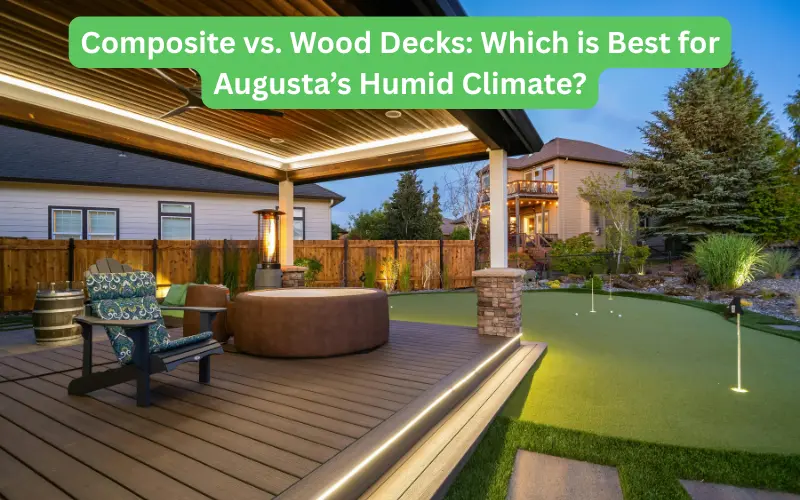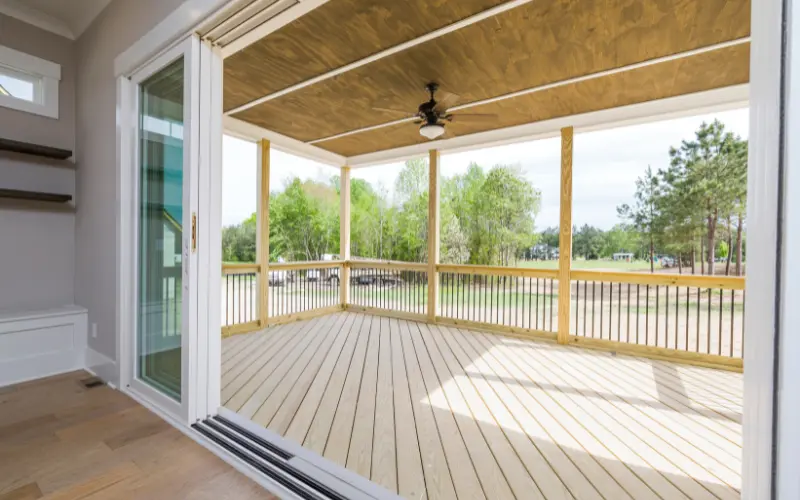In Augusta, GA, where summer humidity averages 75% and annual rainfall tops 45 inches, your deck faces constant moisture and UV challenges. Wood decks bring classic charm but struggle with upkeep, while composite decks offer durability with minimal care. This guide compares wood and composite decks on durability, maintenance, cost, and suitability for Augusta’s humid climate, helping you choose the best option for your backyard.

Understanding Wood Decks: Pros and Cons in Augusta’s Climate
Wood decks, built using cedar or pressure-treated pine, provide a timeless look for Augusta homes.
Pros of Wood Decks
- Classic Appeal: The natural grain and warm tones create an authentic, inviting feel that blends seamlessly with Augusta’s lush, green landscapes and traditional home styles.
- Affordable Upfront: Materials are budget-friendly at $3-8 per square foot, with full installation costing $10-25 per square foot, making it accessible for many homeowners starting a project.
- Customizable: Wood is straightforward to cut, shape, or stain, allowing for personalized designs such as built-in seating or railings.
Cons of Wood Decks
- High Maintenance: In Augusta’s humid environment, wood needs annual sealing and staining to protect against water absorption, which can lead to warping, splintering, or cracking over time.
- Shorter Lifespan: Typically endures only 10-15 years before significant wear; Augusta’s proximity to the Savannah River increases risks of mold growth and insect infestations.
- Weather Vulnerability: Exposed to intense UV rays and frequent showers, wood fades quickly and swells with moisture, often requiring early repairs or replacements.
Without regular care, wood decks in Augusta face costly repairs due to humidity-driven wear, but when maintained properly, can be a great addition to any home.
Understanding Composite Decks: Pros and Cons in Augusta’s Climate
Composite decks, made from recycled plastic and wood fibers (e.g., Trex or TimberTech), are engineered to resist tough weather conditions.
Pros of Composite Decks
- Humidity Resistance: Designed to repel water and prevent rot or mold, composites perform exceptionally well in Augusta’s steamy summers and wet winters, ensuring structural integrity year-round.
- Low Maintenance: Unlike wood, composites require no annual staining or sealing—just occasional cleaning with soap and water, which is ideal for busy families.
- Long-Lasting: Built to last 25+ years with advanced fade-resistant technology, many brands offer warranties of 25-50 years covering staining, fading, and structural defects.
- Eco-Friendly: Constructed from recycled materials like plastic bottles and wood scraps, composites reduce environmental impact and support growing focus on sustainable building practices.
Cons of Composite Decks
- Higher Cost: Initial materials range from $5-20 per square foot, with installation at $25-85 per square foot, representing a larger upfront investment for projects.
- Heat Retention: In constant sunlight, some composite boards can absorb and retain heat, making them warmer underfoot, though many of the top composite brands include formulations with cooling tech help alleviate this issue.
- Repair Challenges: If damaged, individual boards are more difficult to replace or repair compared to wood, potentially requiring a professional to come out and fix it.
Composites thrive in Augusta’s muggy environment, and with many different brands to choose from, there is no shortage or options homeowners have to select the perfect composite for their deck.

Cost Comparison: Short-Term vs. Long-Term Savings
When comparing a 300 square foot deck, a wood construction would cost around $10,000-$15,000, including labor, making it an affordable upfront choice, while composite decks would cost around $15,000 – $25,000. Wood demands annual sealing, costing $500-$1,000, to combat humid climates, where rot is a common problem. In contrast, composites need only occasional cleaning, offering significant long-term savings. Depending on how long homeowners stay in their current house, composites often are more cost-effective over time due to their higher durability.
Environmental and Practical Considerations
When choosing deck materials, environmental and practical considerations are key. Composite decks reduce landfill waste and align with a push for sustainable building in 2025. Wood decks, while sourced from managed forests, often involve chemical treatments that can harm local soil and waterways. Composites offer 25-50 year warranties, ensuring durability in humid climates and boosting home resale value. Wood suits tighter budgets but requires consistent maintenance to prevent moisture-related issues. Both install in 1-2 weeks, with composites better enduring weather shifts for long-term reliability.
Which is Best for Augusta’s Humid Climate? Our Recommendation
For Augusta’s humid climate, with its relentless 75% summer humidity and 45 inches of annual rainfall, composite decks stand out as the superior choice. Their unmatched moisture resistance prevents rot and mold, while their low-maintenance design frees you from the annual sealing wood demands, saving time and money. Backed by 25-50 year warranties, composite brands like Trex, TimberTech, or Fiberon ensure decades of durability and eco-friendly appeal. If on a strict budget, wood is the logical choice, but it struggles against Augusta’s weather, and also causes frequent repairs years down the road. Choose composites for a worry-free, sustainable deck that thrives in this climate.
Don’t wait to transform your Augusta backyard—call DeckSavvy Masters at 706-480-2425 to schedule your free, personalized deck consultation today!
